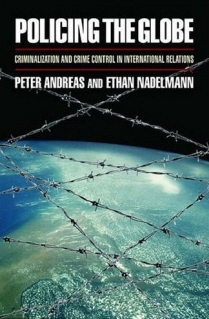The academic discipline of international relations pays little heed to crime control and the academic discipline of criminal justice pays little heed to international politics, note Peter Andreas and Ethan Nadelmann early in "Policing the Globe." That has left a lacunae they have nicely filled in their study of the rise of international cooperation in policing -- and where it might go from here.

As an academic work, "Policing the Globe," while eminently readable (unlike some academic prose), is likely to be mostly read by serious researchers and students of its subject matter. That's a shame, for Andreas and Nadelmann shed considerable light on the evolution of the ever-more-integrated international police apparatus. Given the acceleration of that integration since the attacks of September 2001 and the technological advances leading us ever closer to an Orwellian surveillance society, it might behoove us to pay some attention.
While "Policing the Globe" is not indecipherable academic-speak, it is dense. But it is also chewy. It's the kind of writing where you start out underlining the really important parts, but quickly find you have to switch to quick slash-marks on the page margins because otherwise you're going to underline half the damn book.
The rise of international cooperation in crime control is because of the rise of international crime, right? Seems reasonable, but as Andreas and Nadelmann explain, it's not quite that simple. It has instead been a process lasting hundreds of years, beginning with efforts to eradicate piracy and slavery, and moving through the attempt by European states to suppress political opponents, the crusade against international prostitution, the war on drugs, and now, the war on terror.
And the liberal model of a police response to a crime problem doesn't explain it. In fact, it begs the question: What is a criminal activity and why? The most vivid examples of international police cooperation and global prohibition regimes revolve around activities that weren't even crimes a century ago: drug trafficking and use, money laundering, the traffic in migrant humans, and political violence (or terrorism, which presents its own sticky definitional and political problems).
To really explain the rise of international crime control, argue Andreas and Nadelmann, one must also incorporate some realpolitik and some social constructivism into the mix. In realpolitik, stronger states impose their wills on weaker ones, and the pair show how that has been the case here. At the beginning, cooperation among European states paved the way, but in the past century, and especially since World War II, the United States, as the most powerful state actor, has been largely able to impose its criminal justice preferences on the rest of the world. To the extent it has been able to do that, it has made international criminal law more homogenous, more in line with that of its own.
But American preferences are determined not just by economics, politics, or national security, but also by appeals to morality and the fight against evil. Indeed, what the authors call "transnational moral entrepreneurs" have played a key role in the creation of the global slavery, white slavery, and drug prohibition regimes. If we want to understand global criminality, we have to understand how it is created.
Andreas and Nadelmann spend the middle section of "Policing the Globe" carefully describing the evolution of international crime control. In sometimes exhausting detail, they note the rise of international cooperation against European anarchist assassins and other political "criminals," and their gradual displacement as the primary creators of the international crime consensus by the Americans. Now, the DEA and the FBI have offices in dozens of countries across the world.
And where will we go from here? Global drug prohibition is likely to hang around despite its failures and collateral damage, the pair predict. "The failure of a global prohibition regime does not necessarily signal its future demise," they write. Instead, its "symbolic allure" as a means of moral disapproval is likely to ensure that it continues. "Open defection from the regime is highly unlikely any time soon."
But they do point to some nibbling around the edges. The global consensus on marijuana is crumbling, they note, and the rise of coca-friendly Evo Morales to the Bolivian presidency could lead to erosion of the UN Single Convention prohibition on the coca plant, or even a direct challenge to the convention itself.
But "Policing the Globe" is larger than the drug war, and it raises serious concerns about the broader implications of what could be the coming global police state (my words, not theirs). All in all, Andreas and Nadelmann have produced an important work, one that should be essential for anyone interested in global policing. Given some of the trends the pair identify, however, this book should probably be required reading for anyone interested in the preservation of freedom in the 21st Century.
This work by StoptheDrugWar.org is licensed under Creative Commons Attribution-ShareAlike 4.0 International
Add new comment